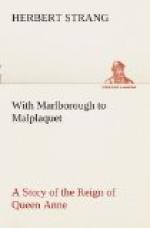“You have saved my life, my lad; you are an Englishman worth knowing,” were the next words the boy heard.
They came buzzing into George’s ears some ten minutes later, when, the brush with the French over, the Englishmen were hastening back to report to the General.
“What happened when I fell, sir?” George asked with curiosity, as the officer walked by the side of the litter. He was astounded to learn that the Frenchman had been found still held in tight grip, his neck broken. The enemy had been put to the rout and had fled, leaving their flag behind them. Moreover, the French camp a couple of miles away had been spied.
“You have three ribs broken, Fairburn,” the officer went on, “and you’ve got about as many bruises as there are days in a year. But what of that. By Jerusalem! I wish the honour had fallen to me!”
“I don’t mind the wounds a bit, sir,” George answered, cheerfully, “so long as I’ve been of some use.”
The next day no less a person than the great Earl of Galway himself came to speak to the wounded lad.
“I have heard from your lieutenant here the tale of your doings yesterday,” he said, with a smile. “You are a boy of pluck. You are done for so far as the present campaign is concerned, and must be sent back to hospital. But there’s work cut out yet for a lad of your mettle.”
George heard all this praise as if in a dream. He was never sure in after years whether the Earl had really said so much. But Lieutenant Fieldsend, who was destined to become his comrade on many a hard-fought field, and his warm friend for life, was always prepared to tell the full and correct story.
CHAPTER VI
THE ROCK OF GIBRALTAR
“This is better than lying on one’s back in hospital, sir, and better than dodging about in a close-packed transport.”
The words came from George Fairburn, as with his officer, Lieutenant Fieldsend, he stood surveying, from its northern vicinity, the far-famed Rock of Gibraltar. It was the summer of 1704. His doings since the day of his injuries in the dingle are soon recorded. After months of sickness and a winter of inaction, his service under Lord Galway had come to an end, much to his disgust at first. With others, he had been sent on board a vessel and carried round the coast of Spain to the neighbourhood of Barcelona, where Sir George Rooke was operating. The new troops had arrived too late. The Admiral, despairing of making any impression on the strongly-fortified Barcelona, was about to sail for home. On the way the idea had come to Sir George that the commanding fortress of Gibraltar would be worth trying for. He had accordingly landed a number of troops on the narrow isthmus of flat land that joins the rock and town of Gibraltar to the mainland.
“Yes, Fairburn,” the lieutenant replied, with a laugh, “my Lord Galway foretold that you had work cut out for you. Here it is, I fancy, and plenty of it.”




